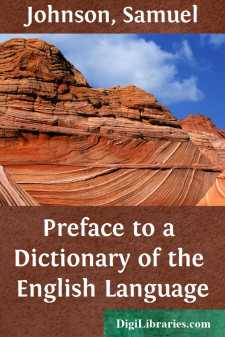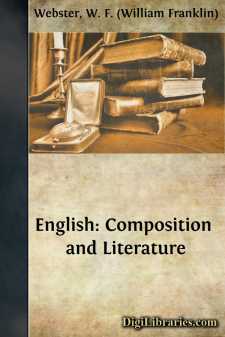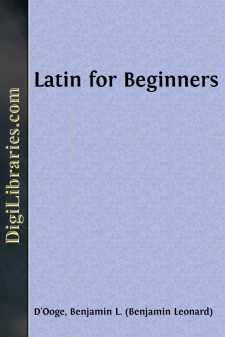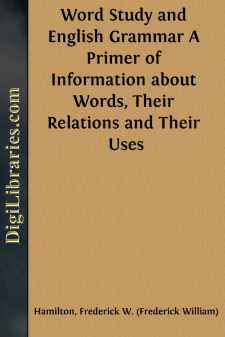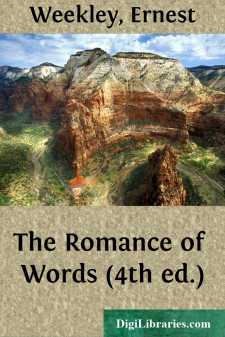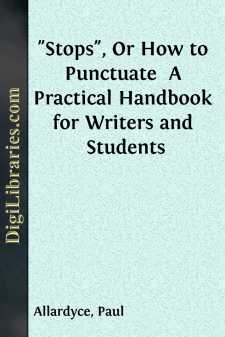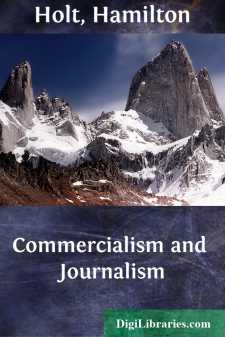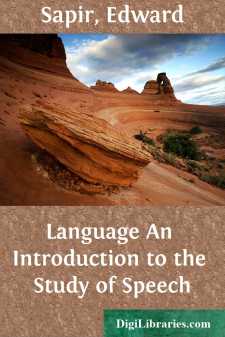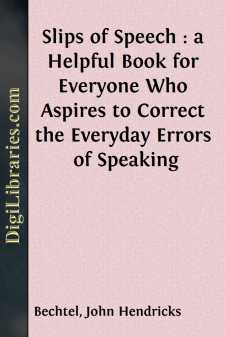Language Arts & Disciplines
Language Arts & Disciplines Books
Sort by:
by:
Samuel Johnson
It is the fate of those who toil at the lower employments of life, to be rather driven by the fear of evil, than attracted by the prospect of good; to be exposed to censure, without hope of praise; to be disgraced by miscarriage, or punished for neglect, where success would have been without applause, and diligence without reward. Among these unhappy mortals is the writer of dictionaries; whom mankind...
more...
PREFACE In July, 1898, I presented at the National Educational Association, convened in Washington, a Course of Study in English. At Los Angeles, in 1899, the Association indorsed the principles of this course, and made it the basis of the Course in English for High Schools. At the request of friends, I have prepared this short text-book, outlining the method of carrying forward the course, and...
more...
LATIN FOR BEGINNERS TO THE STUDENT—BY WAY OF INTRODUCTION What is Latin? If you will look at the map of Italy on the opposite page, you will find near the middle of the peninsula and facing the west coast a district called Latium,1 and Rome its capital. The Latin language, meaning the language of Latium, was spoken by the ancient Romans and other inhabitants of Latium, and Latin was the name applied...
more...
Word study and English grammar are important to the young printer for several reasons. In the first place, disregard of the correct use and combination of words is a distinct mark of inferiority and a serious bar to business and social advancement. A man's use of words is commonly taken as a measure of his knowledge and even of his intelligence. Carelessness in this regard often causes a man to be...
more...
by:
Ernest Weekley
PREFACE A long and somewhat varied experience in language teaching has convinced me that there are still, in spite of the march of science, many people who are capable of getting intellectual pleasure from word-history. I hope that to such people this little book, the amusement of occasional leisure, will not be unwelcome. It differs, I believe, from any other popular book on language in that it deals...
more...
by:
Paul Allardyce
INTRODUCTION The Use of Punctuation.—Punctuation is a device for marking out the arrangement of a writer's ideas. Reading is thereby made easier than it otherwise would be. A writer's ideas are expressed by a number of words arranged in groups, the words in one group being more closely connected with one another than they are with those in the next group. An example will show this grouping...
more...
by:
Hamilton Holt
COMMERCIALISM AND JOURNALISM In the United States of America, public opinion prevails. It is an axiom of the old political economy, as well as of the new sociology, that no man, or set of men, may with impunity defy public opinion; no law can be enforced contrary to its behests; and even life itself is scarcely worth living without its approbation. Public opinion is the ultimate force that controls...
more...
by:
Edward Sapir
I Introductory: Language Defined Speech is so familiar a feature of daily life that we rarely pause to define it. It seems as natural to man as walking, and only less so than breathing. Yet it needs but a moment’s reflection to convince us that this naturalness of speech is but an illusory feeling. The process of acquiring speech is, in sober fact, an utterly different sort of thing from the process...
more...
CHAPTER I THE FIELD FOR SPECIAL ARTICLES Origin of Special Articles. The rise of popular magazines and of magazine sections of daily newspapers during the last thirty years has resulted in a type of writing known as the "special feature article." Such articles, presenting interesting and timely subjects in popular form, are designed to attract a class of readers that were not reached by the...
more...
I shall read, We shall read,You will read, You will read,He will read, They will read. But when I desire to show determination on my part to do a certain thing, or when I exercise my authority over another, or express promise, command, or threat, will is used in the first person and shall in the second and third; as, I will read, We will read,You shall read, You shall read,He shall read, They shall...
more...


